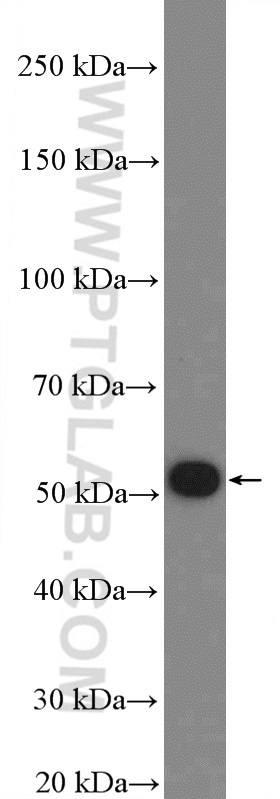验证数据展示
产品信息
27294-1-PBS targets FBXO31 in WB, Indirect ELISA applications and shows reactivity with human, mouse samples.
| 经测试应用 | WB, Indirect ELISA Application Description |
| 经测试反应性 | human, mouse |
| 免疫原 | FBXO31 fusion protein Ag24867 种属同源性预测 |
| 宿主/亚型 | Rabbit / IgG |
| 抗体类别 | Polyclonal |
| 产品类型 | Antibody |
| 全称 | F-box protein 31 |
| 别名 | FBXO14, FBX31, FBX14, F-box only protein 31, F box protein 31 |
| 观测分子量 | 49 kDa, 60-70 kDa |
| GenBank蛋白编号 | BC012748 |
| 基因名称 | FBXO31 |
| Gene ID (NCBI) | 79791 |
| RRID | AB_2880833 |
| 偶联类型 | Unconjugated |
| 形式 | Liquid |
| 纯化方式 | Antigen affinity purification |
| UNIPROT ID | Q5XUX0 |
| 储存缓冲液 | PBS only , pH 7.3 |
| 储存条件 | Store at -80°C. The product is shipped with ice packs. Upon receipt, store it immediately at -80°C |
背景介绍
FBXO31, also known as F-box protein 31, is a substrate recognition protein of the SCF (SKP1-CUL1-F-box protein) E3 ubiquitin ligase complex. It plays a crucial role in mediating the ubiquitination and subsequent degradation of target proteins through the ubiquitin-proteasome system. In pancreatic cancer, FBXO31 is upregulated and promotes cancer progression by targeting proteins like SIRT2 for degradation (PMID: 38216561). In endometrial cancer, FBXO31 acts as a tumor suppressor by regulating the ubiquitination of OGT (O-GlcNAc transferase), which affects cellular O-GlcNAcylation levels (PMID: 39894887). FBXO31 Is a reader of C-terminal amides, which ubiquitylates CTAPs for subsequent proteasomal degradation. A dominant de novo D334N mutation in FBXO31 alters FBXO31 substrate recognition and CTAP clearance, causing some important proteins to be degraded and clinical intellectual impairment or diplegic spastic cerebral (PMID: 39880951).
